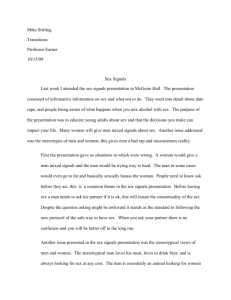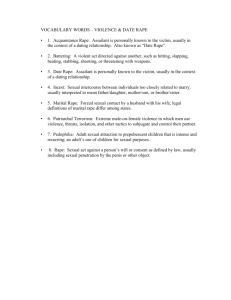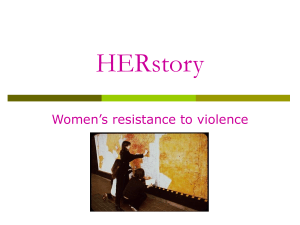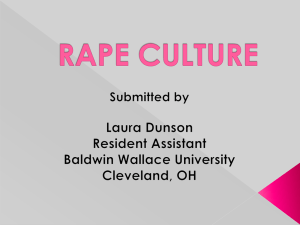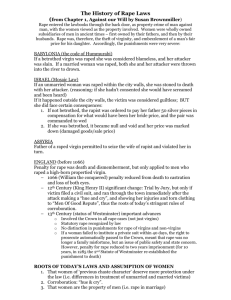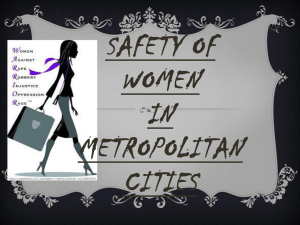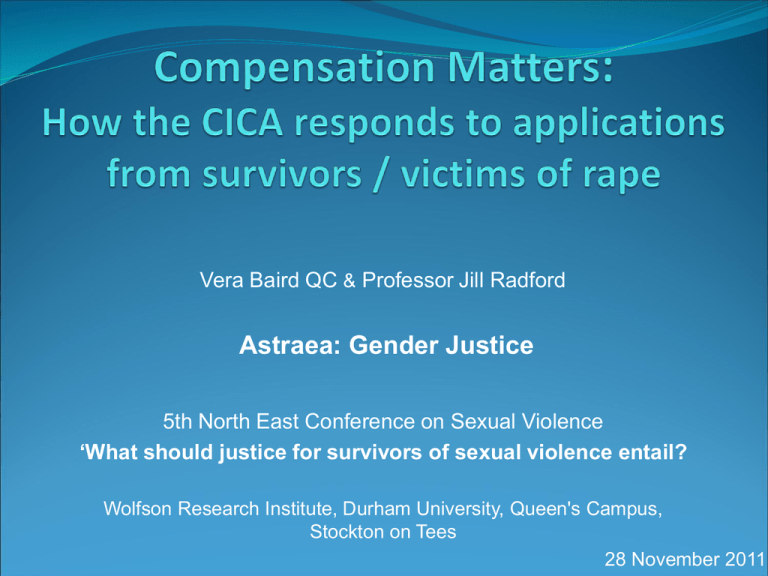
Vera Baird QC & Professor Jill Radford
Astraea: Gender Justice
5th North East Conference on Sexual Violence
‘What should justice for survivors of sexual violence entail?
Wolfson Research Institute, Durham University, Queen's Campus,
Stockton on Tees
28 November 2011
‘What should justice for survivors of sexual
violence entail?
Astraea is committed to working for situation where all
women are
♀ Treated with dignity, respect and fairness in all aspects of
the justice system
♀ Entitled to quality woman-centred support services
delivered by experienced, well-informed, empathetic,
agencies – like RCCs
♀ Whose struggle for survival and funding are historic – but
probably never harder than now – eg Fawcett
‘Don’tTurnBackTime’ fight back campaign
http://www.fawcettsociety.org.uk
2
Why Compensation Matters?
That nothing can compensate the horror of rape or undo its
harms is an irrefutable truth.
However, as RCF notes:
For survivors an award of compensation can be validating -
a societal acknowledgement that a serious wrong has been
committed against them, irrespective of whether the
perpetrator is identified, arrested, charged or convicted.
(http://www.rapecrisis.org.uk/Compensation2)
For those let down by the CJS given - the high attrition rate
for rape - an award of compensation may represent a kind
of personal justice
3
Further, an award of compensation can provide a
sense of closure:
'Now I can have peace of mind that I can have
more time to mend the pain and continue with the
rest of my life’.
Caroline Fairfax Scott[ (20.09.10) Daily Mail )
http://www.dailymail.co.uk/news/article-127511/Rape-victim-winscompensation-battle.html
So compensation for rape survivors does matter.
And how the Criminal Injury Compensation Authority
treats compensation applications matters too
4
CICA: not previously scrutinised
To date, the CICA and the Criminal Injuries Scheme
(CICS) has been subject to little research or
evaluation – with the exceptions of:
‘Women against Rape’ - campaigns on individual cases – to
highlight CICA’s response to rape survivors who had taken
drugs or alcohol - leading to change in 2008
http://www.womenagainstrape.net/campaign/compensation-character-conductcampaign
Baroness Stern’s Review into how rape complaints are
handled by Public Authorities 2010; 2011
http://beneaththewig.com/wpcontent/uploads/2011/08/Stern_Review_acc_FINAL
4.pdf
5
Contrast with law and criminal justice agencies
This contrasts with law and other criminal justice agencies,
which since the 1970s, have been subject to sustained
feminist research, critique and campaigning.– for example:
Smart 1976; Radford and Jeffreys 1984; Adler 1987;
Kelly, 1988, Lees 1993, 1994, 1997, 1999,
2001;Temkin, 1993, 2000, Temkin and Krahé 2008;
Kelly et al 1988, 2001, 2005, 2011
The earlier work led to limited reforms in the 1980s and
1990s
Post 2000 the Labour govt engaged with the issues raised
by feminists: ‘Setting the Boundaries’ 2000; Sexual
Offences Act 2003, and VAWG Strategy 2009, Stern 2010
6
Rape: Some Official Statistics 2009-2010
British Crime Survey (BCS) 2009/10
Rape: 0.3% women and 0 men ≡ 51,429 women (16 -59 yrs) in
the previous year; 11% of whom reported it to police
http://www.homeoffice.gov.uk/publications/science-researchstatistics/research-statistics/crime-research/hosb0111/hosb0111?view=Binary
Home Office Recorded Crime Statistics 2009/10
9,102 women and 372 men made a complaint of rape to the
police (over 16 yrs)
http://www.homeoffice.gov.uk/publications/science-researchstatistics/research-statistics/crime-research/hosb1011/
Ministry of Justice, CJ Statistics England & Wales 2010
2479 men proceeded against for rape;
884 convicted
7
How many applications does the CICA
receive from rape survivors?
Answers to PQs (2011) show CICA categorizes by injury not by
crime
However: CICA told us:
In 2009-10, 1618 applicants described the incident as ‘rape’
But when asked for the figure by regions – total of applicants
describing a rape totalled: 3420 for 2009 -10
8
Further Problems with CICA statistics 2009-10
No. of CIC Awards to survivors with ‘rape type’ injuries
726 full awards + 52 reduced awards (= 778)
Answer to PQ 22.11.11
http://www.publications.parliament.uk/pa/cm201011/cmhansr
d/cm111122/text/111122w0001.htm#111122114000065
1619 awards to women and 266 to men
( = 1885)
05.07.11
http://www.publications.parliament.uk/pa/cm201011/c
mhansrd/cm110705/text/110705w0005.htm
947 awards to women and 72 to men
(=1019)
correspondence with us Dec 2010
9
Triangle of Attrition
51,429 women disclosed rape BCS
9,102 reported to police
2479 men proceeded against
for rape; 884 convicted
awarded compensation
¿ 778-1885?
Figures for 2009-10
10
Methodology
A Pilot Study – as yet unpublished
Multi-stranded methodology
♀ Literature search for existing research and media
coverage
♀ Critical reading of CICS
♀ Questions to CICA
♀ Parliamentary Questions
♀ Questionnaire survey –
♀ Victim Support Agencies,
♀ Rape Crisis Centres and
♀ Solicitors advertising this area of work
♀ Case Studies gathered from solicitors
11
Research Problems
Limited research resources
Limited existing research literature
CICA is less open and accessible than the CJS;
individual applications are done in writing and
appeals not open to public scrutiny
Relatively small population of applicants
For distribution of our questionnaires we were
reliant on busy 3rd party support agencies - VS
and RCF
[VS receive most referrals from police and RCC from a range of
sources including self referrals]
12
Number of Responses
12* agencies responded - of these
9 were from local Victim Support (VS) Agencies
2 were from Rape Crisis Centres (RCC)
1 was from a solicitor in private practice
However, according to figures provided,
the no. of survivors these agencies supported in 2009/10 is
sizeable:
VS
557
RCCs
680
Sol
2
Total
1139
* Currently awaiting more responses and have questionnaires with us –
as disappointingly we had no responses from the N/E
13
How many survivors supported by RCC and VS go on
to submit applications for CIC?
VS responses varied:
7% - 50% of survivors applied to CICA with help
from general VS support staff.
However when survivors were referred to specialist
legal help through VS:
95% - 100% where clients wanting to apply were
referred on to specialist CIC volunteers
RCCs – 1 RCC didn’t know and
1 RCC reported that “nearly all” applied
14
The Criminal Injuries
Compensation Scheme
Was established in 1960s to compensate
blameless victims of crime for criminal
injuries caused in the UK.
It was reviewed most recently in 2008
15
Criminal Injuries Compensation
Authority
Is a Non-Departmental Public Body which
administers the Scheme
Applications are made on paper/online with
documentary including medical report support.
A CICA Case Officer will be allocated who will ask
for the police report and make a decision on
compensation according to the Scheme’s eligibility
and exclusions. ( it can take more than 1 yr)
16
Police reports: how important are they?
8 agencies stated that police reports had a major influence on
outcomes
Serious consideration is always given to police
reports by CICA decision makers
VS
Police approach makes a huge difference to the
outcome’ , partly because CICA hold police in high
esteem
Importantly the CICA will not have access to the
evidence, so they have to rely on what the police tell
them about the of the strengths and weaknesses of
the case and credibility of complainant and
defendant.
Solicitor
17
Review and Appeal
If dissatisfied by the outcome, the applicant can ask
for a Review - a fresh look by another Case Officer
After that there is an Appeal to the First Tier Tribunal
There is a tariff system for injuries. Psychiatric injury
can be claimed for. £11,000 is the tariff for rape
The eligibility rules are the same across all offences
Although the scheme was reviewed in 2008, there is
no acknowledgement of the gendered nature of
sexual offences
18
Blamelessness
CIC compensates “blameless victims of crime”
The blameless citizen is victim of an unprovoked
act, not contributed to by her
Who does her public duty in reporting
immediately to police to give best chance of arrest
Supports police and prosecution throughout
Is blameless also in having no convictions
All the eligibility criteria concern “blamelessness”
19
Blame in the discourse of rape
Woman blame has a particular history in relation to rape –
historically shaping its understandings in male dominated
cultures.
Still evident in professional practice, in powerful and persistent
rape myths and in popular culture.
Westmarland, N and Graham, L. (2010) myths remain constant,
while ever changing and so need to be constantly challenged
and resisted - an analysis of an Internet discussion on “The
Verdict”
Challenging and resisting in feminist work round rape has
impacted on law, police & criminal justice practice
To what extent does ‘CICA’s emphasis on ‘blameless’ deter
rape survivors from applying and / or influence outcomes of
claims?
20
And still more on Blamelessness
CICA: “We have no evidence to suggest this is the
case” (in answering our questions)
Our respondents:
Did not raise the question of blame or
blamelessness directly - though one commented:
“Information about strict eligibility rules can
lead clients to feel its not worth claiming”
(solicitor)
21
No. of reduced awards for Rape
Year
Full
Convictions Delay Not
Other
Award / Character Repor Supporting
ting
prosecution
2006/7
377
42
3
4
81
2007/8
504
30
2
31
14
2008/9
773
44
1
2
21
2009/10
726
49
0
3
0
2010/11
854
71
3
2
0
http://www.publications.parliament.uk/pa/cm201011/cmhansrd/cm111122/text/111122w0001.htm#111122114000065
22
Problematic Rules (1)- Conduct at the
time
Rule 13(1)d. Case Officer may withhold or reduce
award where:
conduct of Applicant before/during/after incident
makes it inappropriate that a full award/ any award
be made
13(2) in considering conduct, may withhold/reduce
where excessive consumption of alcohol/use illicit
drugs contributed to circumstances of injury in
such a way as to make award/full award
inappropriate
23
Problematic Rules (1) cont
Stern Review finds rape victims refused
compensation because they’d drunk alcohol prior
to the offence.
Helen: raped after having drink spiked. Award of
£11000 reduced by 25%. CICA: “Your excessive
consumption of alcohol was a contributing factor”
Helen: “Back to the 70s-“she was asking for it”
CICA eventually backtracked:
“it is never an individual’s fault ifs/he
gets raped; regardless of how much
he/she has had to drink”
24
Rule Change welcomed
Our respondents
CICA will seize on anything in a witness
statement to refuse or reduce a claim on the
grounds of applicant’s conduct.
However now see CICA Guide p10:
“If you were sexually assaulted while under the
influence of drugs or alcohol, you will still be
eligible for a full award as long as you meet all
our other criteria’ !!!
A local Victim Support Agency
25
Problematic Rules (2) No immediate
report to police/not co-operating
Rule 13(1)Claims Officer may withhold/reduce
award where
(a) Applicant failed to take without delay all
reasonable steps to inform police or
(b) failed to co-operate in bringing assailant to
justice
Miss L: raped by abusive boyfriend, can’t say. 2 wks
cries & tells co-worker, 1 month-hospital PTSD.
Police 4mths. Formal Report 7 mth. Refused
compensation - “delayed reporting so forensic
evidence lost”
(Case Study from Solicitor 2011)
26
Problematic Rules(2) contd
But the Criminal Courts know that rape
complaints are often delayed see– R v Doody 2009
Judges direct juries: ”Some people may complain
immediately to the first person they see, others
may feel shame & shock & not complain for some
time. A late complaint does not necessarily mean it
is a false complaint”
So Criminal Courts accept delay as part of trauma
while CICA do not - to them it means victim is not
blameless
Stern: “Clearly this is entirely at odds with our
understanding of why rape victims may delay in 27
Problem rule (2) Flexibility?
So we asked CICA What consideration do you
give?
Internal Guidance: 48 hours to report unless “good
reasons” including the psychological effects of
rape
Judges of FTT set precedents for CICA and won’t
use flexibility correctly without training in rape
dynamics
The Equal Treatment Bench Book lists: “Rape
Myths to be Challenged” and includes the R v
Doody rule
But this is addressed to criminal judges who also
28
Problem Rule 2 – no flexibility!
In contrast with the position on late complaints, the
Guidance to case workers gives no discretion to allow a
claim if the applicant has failed to co-operate fully with
the prosecution.
So it seems clear that the complainant, even if she has
reported in a timely way, who for any reason can’t go to
court will not entitled to a CIC claim
We consider that recognition of the trauma associated
with rape ought to exclude rape complainants from the
requirement to co-operate with the prosecution, unless
there are exceptional circumstances
29
Late Reporting to Police: Respondents Experiences
4 /9 local VS agency stated that late reporting to the police
was a very influential factor that led to refusals;
1 VS said
‘there is more discretion in rape cases than other
serious crimes’.
Solicitor:
‘It may result in an initial refusal which can be challenged on
appeal
1 RCC
It leads to automatic refusal, survivors can ask for a review
and appeal, but many are already too disheartened to persist
in these circumstances.
I think the guidance should say such claims are automatically
refused and alert survivors that if there’s a late report to
police, such claims can only be settled by an Appeal Panel
30
Not Supporting Prosecution:
respondents’ experiences
11/12 Respondents stated this is a very important
criterion
“Failure to support prosecution leads to the claim
being refused. It is a rule and my team have been
instrumental in following this rule “ VS local
“Almost certain to be refused and may not succeed
on appeal” Solicitor
31
Problematic Rules (3)
Rule 13(1)Claims Officer may withhold/reduce
award if
(e) The applicant’s character as shown by her
convictions / evidence makes full/any award
inappropriate
Ms S raped, beaten & while working as a prostitute;
award cut by 25% for “character & unlawful
conduct”
Stern: cites Judge in trial 2010 “Prostitutes are
entitled to the same protection of the law as
everyone else” Should be no such requirement for
rape victims unless exceptional circumstances –
government disagrees
32
Problematic Rules (3) cont
PQ November 24th 2011:
Deductions for convictions are done on a points
system
“Prostitutes may have numerous convictions
...which would add up to 10 points” – meaning their
applications would be refused
“Since … a prostitute may be considered to be a
victim themselves, it is our policy to count all the
convictions for soliciting as one offence”
33
Bad Character & Previous Convictions
Respondents Experiences
11/12 respondents thought this was very important
“Clearly a big factor” –VS
“If there was a supplementary claim for loss of earnings and
enquiries reveal that income did not match tax paid, they will
refused on the grounds of ‘conduct before’ “ VS
‘One client was technically an illegal immigrant at the time of
the incident, but due to bringing the offender to justice, was
awarded a 50% reduced award, which she accepted’ VS
‘Very important: usually linked to insufficient evidence to
prosecute and likely to affect outcome on appeal ‘– Solicitor
34
Conclusions
We have raised awareness of problems how the
CICS works for survivors especially in that the
eligibility rules are in conflict with modern
understandings of rape
Underpinning them all is the requirement of
blamelessness. Blaming of women has a strong
history in how the justice system deals with rape.
Our pilot shows how blame is still misused by the
CICA who have studied little and understood less, as
the agency charged with doing justice for survivors
35
The requirement to report immediately and co-
operate with the prosecution ignores the wide
acceptance that shock and trauma cause delay,
whilst the prospect of re-living the incident in a public
court is beyond many traumatised victims
It’s a welcome, if over due move, that having taken
alcohol or drugs is no longer conduct contributiong to
the incident .
However we still have concerns about the impact of
other rape myths in connection with this exclusionary
rule
36
Not all convictions should affect blamelessness.
Drug use may be part of the aftermath of rape;
soliciting should be disregarded
Women should not have to argue themselves out of
rules which should not be a bar in the first place
Neither case workers or FTT Judges are trained to
understand rape, so as even to be able to exercise
discretion under the current rules
Despite limitations the CJS is ahead of the CICA and
Tribunal in dealing justly with rape survivors
37

